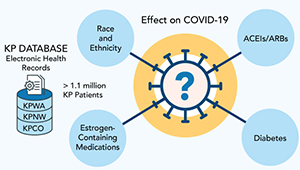Susan Shortreed, PhD
Biography
Susan Shortreed, PhD, uses statistics and machine learning methods to address health science problems, with a special emphasis on analyzing complex longitudinal data. She develops and evaluates statistical approaches for observational data and works to improve the design and analyses of studies that use data collected from electronic health care records. She led a project to develop statistical methods for constructing personalized treatment strategies using data captured from electronic health records.
Dr. Shortreed earned her PhD in statistics from the University of Washington. Then she spent two years in the Department of Epidemiology and Preventive Medicine at Monash University in Melbourne, Australia, and two years in the School of Computer Science at McGill University in Montreal, Canada. Dr. Shortreed has collaborated with scientists in a broad range of areas including alcohol use, cancer screening, and medication safety. She now works alongside researchers in mental and behavioral health, evaluating and comparing treatments for chronic pain and depression, and interventions to prevent suicide. Dr. Shortreed is the Analytic Methods Core Lead the Mental Health Research Network, helping to design studies to address important public health concerns, such as determining which antidepressant medications work best for which patients and developing risk prediction algorithms to identify individuals who may be at increased risk for suicide.
Dr. Shortreed is also an affiliate professor of biostatistics at the University of Washington School of Public Health. She served on the executive board for the American Statistical Association’s Mental Health Statistics Section and the editorial boards for Observational Studies and Biometrics.
Research interests and experience
-
Biostatistics
Design and analysis of studies that use data collected from electronic health records; analysis of complex longitudinal data; methods for constructing personalized treatment strategies, computational statistics and algorithms; machine learning; variable selection methods.
Medication Use & Patient Safety
Biostatistics; machine learning; using data collected from electronic health records to study rare adverse events; opioid safety; medication safety in pregnancy.
-
Mental Health
Biostatistics; treatment for chronic depression; suicide prevention; developing personalized treatment strategies; developing risk prediction models.
Recent publications
Simon GE, Wellman R, Shortreed SM, Johnson E, Sterling SA, Coleman KJ, Ahmedani BK, Yaseen ZS, Mosholder AD Predicting and differentiating opioid and non-opioid drug poisonings using health records data 2025 Dec 22;182:209861. doi: 10.1016/j.josat.2025.209861. Epub 2025-12-22. PubMed
Minus E, Coley RY, Shortreed SM, Williamson BD Behavior of prediction performance metrics with rare events 2025 Nov 10;189:112046. doi: 10.1016/j.jclinepi.2025.112046. Epub 2025-11-10. PubMed
Simon GE, Shortreed SM, Johnson E, Ahmedani BK, Sterling SA, Campbell CI, Hechter RC, Ziebell RA, Parthasarathy S Risk of self-harm and overdose after starting buprenorphine for opioid use disorder 2025 Sep;96:90-96. doi: 10.1016/j.genhosppsych.2025.06.010. Epub 2025-06-24. PubMed
McAteer S, Wartko P, Hajat A, Fuller S, Shortreed SM, Butler AM, Enquobahrie DA, Garcia R, Dublin S Racial and Ethnic Disparities in the Incidence and Treatment: of Urinary Tract Infection During Pregnancy 2025 Aug;34(8):985-993. doi: 10.1089/jwh.2024.0940. Epub 2025-04-29. PubMed
Cruz M, Shortreed SM, Simon GE, Coley Y Evaluating Clinical Implementation of Risk Prediction Based Interventions Using Difference-In-Differences 2025 Jul 21 doi: 10.1111/1475-6773.70015. Epub 2025-07-21. PubMed
Osmundson SS, Nickel KB, Shortreed SM, Dublin S, Stwalley D, Durkin MJ, Wartko PD, Sahrmann JM, Colvin R, Butler AM First-Trimester Antibiotic Use for Urinary Tract Infection and Risk of Congenital Malformations 2025 Jul;8(7):e2519544. doi: 10.1001/jamanetworkopen.2025.19544. Epub 2025-07-01. PubMed
Thaweethai T, Mukherjee R, Arterburn D, Fischer H, Lee C, Shortreed SM, Haneuse S Adjusting for Selection Bias Due to Missing Data in Electronic Health Records-Based Research by Blending Multiple Imputation and Inverse Probability Weighting 2025 Jul;44(15-17):e70151. doi: 10.1002/sim.70151. PubMed
Simon GE, Ziebell RA, Johnson E, Shortreed SM Do health records data accurately identify repeat self-harm after emergency department visits? 2025 Jun 27 doi: 10.1101/2025.06.26.25330358. Epub 2025-06-27. PubMed
Sun S, Haneuse S, Levis AW, Lee C, Arterburn DE, Fischer H, Shortreed S, Mukherjee R Estimating weighted quantile treatment effects with missing outcome data by double sampling 2025 Apr 2;81(2). doi: 10.1093/biomtc/ujaf038. PubMed
Benz L, Mukherjee R, Wang R, Arterburn D, Fischer H, Lee C, Shortreed SM, Haneuse S Adjusting for Selection Bias Due to Missing Eligibility Criteria in Emulated Target Trials 2024 Dec 26 doi: 10.1093/aje/kwae471. Epub 2024-12-26. PubMed
Research

COVID risks not meaningfully greater with estrogen-containing medications
Oral contraceptives, hormone therapy not linked to more severe COVID outcomes.
Research

A medication that can relieve symptoms of psychosis is underused
Study finds that many patients who might benefit from clozapine don’t receive it.
Research

New findings on treating hypertension in pregnancy
A study led by Dr. Sascha Dublin finds similar outcomes for 3 hypertension medications, filling an evidence gap.
COVID-19

Greater infection risks linked to COVID-19 disparities
New work by Susan Shortreed, PhD, finds infection risks drive worse outcomes for some racial and ethnic groups.
Drugs, diabetes, disparities

Studying COVID-19 risk and outcomes
Dr. Sascha Dublin tells how studies of KP electronic health record data can improve COVID-19 treatment and prevention.
KPWHRI IN THE MEDIA
Simpler models for predicting suicide risk work comparably to more complex ones
Q&A: Simple machine learning model predicts suicide risk well
Healio Psychiatry, April 12, 2023



